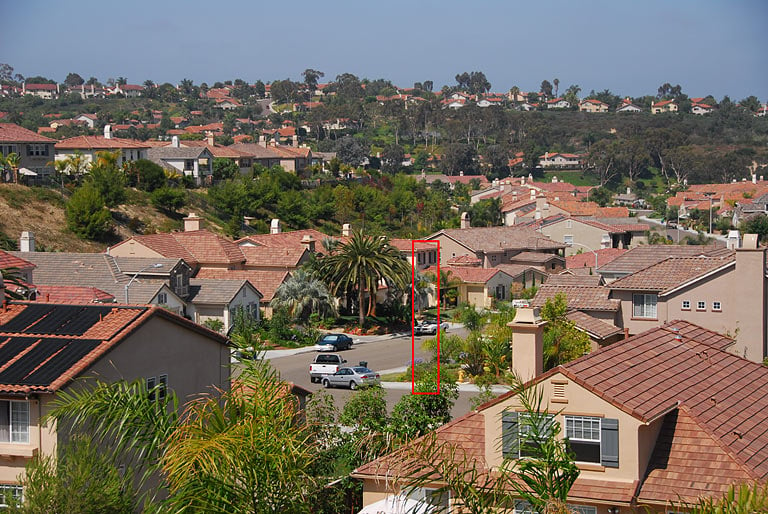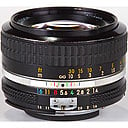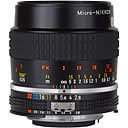Depth of field (DOF) is the portion of a scene that appears sharp in the image.
[source from From Wikipedia, the free encyclopedia]
Precise focus is possible at only one distance; at that distance, a point object will produce a point image.[1] At any other distance, a point object is defocused, and will produce a blur spot shaped like the aperture, which for the purpose of analysis is usually assumed to be circular. When this circular spot is sufficiently small, it is indistinguishable from a point, and appears to be in focus; it is rendered as “acceptably sharp”. The diameter of the circle increases with distance from the point of focus; the largest circle that is indistinguishable from a point is known as the acceptable circle of confusion, or informally, simply as the circle of confusion. The acceptable circle of confusion is influenced by visual acuity, viewing conditions, and the amount by which the image is enlarged. The increase of the circle diameter with defocus is gradual, so the limits of depth of field are not hard boundaries between sharp and unsharp.
Several other factors, such as subject matter, movement, and the distance of the subject from the camera, also influence when a given defocus becomes noticeable.

some basic formula which related to MACRO/Close-up
Decreasing the focal length f increases the second term in the denominator, decreasing the denominator and increasing the value of the right-hand side, so that a shorter focal length gives greater DOF. The effect of focal length is greatest near the hyperfocal distance, and decreases as subject distance is decreased. However, the near/far perspective will differ for different focal lengths, so the difference in DOF may not be readily apparent. When the subject distance is small in comparison with the hyperfocal distance, the effect of focal length is negligible, and, as noted above, the DOF essentially is independent of focal length.
c = Circle of Confusion (based on table below for APS-C c=0.018
m = magnification
Circle of confusion diameter limit based on d/1500
| Film format | Frame size[1] | CoC |
|---|---|---|
| Small Format | ||
| Four Thirds System | 18 mm × 13.5 mm | 0.015 mm |
| APS-C[2] | 22.5 mm × 15.0 mm | 0.018 mm |
| 35 mm | 36 mm × 24 mm | 0.029 mm |
e.g. which we normally use
1. 1:1 @ F8
DOF = 2 *8*0.0.18*{2/1}
= 0.576mm
2. 1:1 @ F13
DOF = 2 *13*0.0.18*{2/1}
= 0.936mm
3. 1:1 @ F16
DOF = 2 *16*0.0.18*{2/1}
=1.152mm
4. 1.7:1 @ F13
DOF = 2 *13*0.0.18*{2.7/2.89}
= 0.43mm
5. 1.7:1 @ F16
DOF = 2 *16*0.0.18*{2.7/2.89}
= 0.73mm
4. 2:1 @ F16
DOF = 2*16*0.018*{3/4}
= 0.432mm
5. 2:1 @ F22
DOF = 2*22*0.018*{3/4}
=0.594mm
6. 3:1 @F16
DOF = 2*16*0.018*{4/9}
= 0.256
7. 3:1 @F22
DOF = 2*22*0.018*{4/9}
= 0.352
lOl.. now you know what u have :D
How we Increase MACRO/Closeup DOF
base on the formula above, definitely we can increase the DOF by
1. smaller magnification
- then this could end up you are not doing macro...hmmmm
2. bigger aperture number
- but this could cause Diffraction (loss of sharpness or resolution caused by photographing with small f/stops)
- e.g as below (source from http://www.kenrockwell.com/nikon/50-comparison/f-stops.htm)

Guide Image.
1.4 AI at f/1.4 | 1.4 AI at f/2 | 1.4 AI at f/5.6 | 1.4 AI at f/16 | 55 AI-s at f/32 |
 |  |  |  |  |
3. picture stacking which I should talk more @ How do I PP MACRO Pictures
- e.g. where I try to stack 2 picture with front focus and back focus while shoot @ KL Butterfly Park with 3:1 where
the DOF should be only
DOF = 2*(11*1.4)*0.018*{4/9}
= 0.2464
i. shot with front focus

ii. shot with back focus

iii. picture stack both together to get the DOF




6 comments:
interesting.
didn't know that macro shots need to be PP as well..:D
yes .. that'r plenty of PP need to be done ... will create aother post on MACRO PP soon
very good article!!! very usefull!!!
welcome loveblueocean
How to get those two images stack? Like the one in star trails?Im new to Macro..
Author,
a sample
http://liewwk-macro.blogspot.com/2009/01/how-i-increase-my-macro-picture-dof.html
Post a Comment